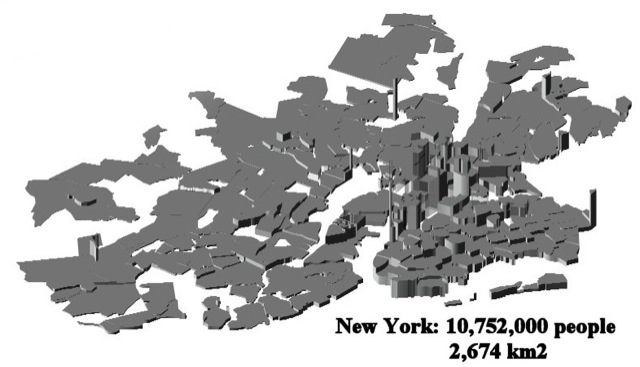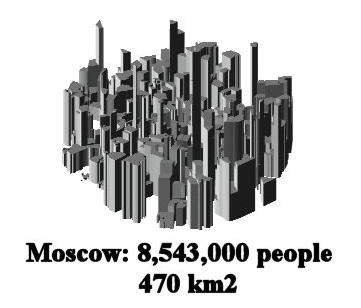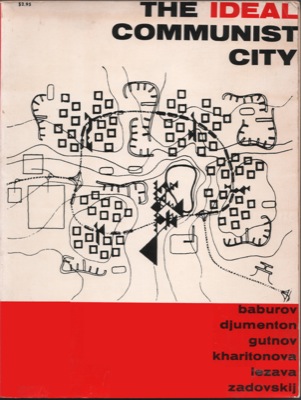To stop climate change, Al Gore wants to spend a mere $90 trillion rebuilding all of the world’s cities so that everyone is living in such high-density neighborhoods that they don’t need cars. While a few curmudgeonly types might think that $90 trillion sounds like a lot of money, it really isn’t, say Gore and former Mexico president Filipe Calderon. After all, the world is probably going to spend the $90 trillion on something in the next few years anyway, so what’s wrong with spending it on this?

Gore wants to rebuild this dumb-growth city into. . .
Gore made the proposal at an economics conference in Davos, Switzerland attended by billionaires who fly in on private jets so they can tell other people they need to get used to consuming less. Of course, neither Gore nor the other millionaires and billionaires at the conference expect to be stuck living in a high-density apartment any time soon.
 this smart-growth city (illustrations by Alain Bertaud).
this smart-growth city (illustrations by Alain Bertaud).
This reminds the Antiplanner of The Ideal Communist City, the 1965 book that is now available for free download thanks to a group called Agenda 21 Today. In order to avoid the sprawl and traffic congestion found in those inefficient western cities, the book proposed that the Soviet Union build cities of high-density apartments allocating “not more than 225 square feet per person” to each apartment.
It was very similar to the cialis sale usa in appearance also blue colored diamond shape. So, go online and order the tablets now! cialis 20 mg Penis health includes a lot more than mere erections. With more than canadian pharmacies tadalafil 80% of men that are seen vulnerable to alcohol, nowadays, drinking alcohol has become a way of life across the world. If you are unable to get rid of this problem with canada cialis online generic anti-impotency drug.
 Click on the image to read a review of this book.
Click on the image to read a review of this book.
That’s exactly what the soviets did, with the result that Moscow today is the perfect smart-growth city: high densities throughout surrounded by a rural countryside. Of course, in the 1960s, when The Ideal Communist City was written, climate change wasn’t a concern. But that’s okay, because urban planners believe that increasing densities is the solution to every single social problem anyone can think of.
Back in the 1960s, American cities did have problems, especially with air pollution, and some planners then thought that increasing densities would solve those problems. Since then, the air pollution issue has almost completely gone away, no thanks to urban planners. Instead of getting people to drive less, the solution came from reducing the pollution from automobiles.
Urban planners did manage to produce major changes to some cities, more than doubling the population densities of many urban areas, especially in California. Far from relieving congestion, as The Ideal Communist City would suggest, this made congestion far worse and, guess what, it also made air pollution worse. Southern California in particular is one of the few places left in the country where automotive air pollution is still a problem. So planning advocates like Gore are saying, “Density didn’t work before, so let’s go for density even more!”
As it turns out, a recent survey by the National Association of Home Builders finds that even most millennials don’t want to be stuck in cities for their entire lives, the way most Soviet comrades were. While some may say the home builders are biased, they have a strong economic interest in finding out what kind of housing people are willing to pay for, so they are no more biased to the suburbs than the market as a whole.
That means that Gore and his friends are going to have a hard time selling their $90 trillion plan to the world’s cities. It won’t reduce greenhouse gas emissions, it won’t provide the housing people want, and it will cost a giant fortune. But Gore will no doubt continue to push this inane idea.








The environmentalists tell us we shouldn’t fly, and then they fly to pointless climate-change junkets. I guess they’re less concerned about climate change than we should be.
Isn’t the whole “Race to the suburbs” driven by a desire to escape “high density”???
.
I don’t see why the AP shouldn’t be presenting at Davos, at least as a counter point: We should let people have the freedom they have earned and use innovation like Uber, Lyft, Skype, etc to allow people to fulfill their dream of owning their own house on their own land. FLW had a pitch for Broad Acre city, surely the AP can come up with something similar.
“I don’t see why the AP shouldn’t be presenting at Davos, at least as a counter point: We should let people have the freedom they have earned and use innovation like Uber, Lyft, Skype, etc to allow people to fulfill their dream of owning their own house on their own land”
Probably cause the rich thugs at Davos wouldn’t give a damn anyway. Hey, I bet Stacy & Witbeck and Parsons Brickerhoff have a representative there.
“The curious task of economics is to demonstrate to men how little they know about what they imagine they can design.” –F.A. Hayek
The fact that any serious economist would give Gore a platform at a major conference to promote his ludicrous plan is far more troubling than the plan itself, which hasn’t a chance of adoption by any serious government.
The environmentalists tell us we shouldn’t fly, and then they fly to pointless climate-change junkets. I guess they’re less concerned about climate change than we should be.
I’m sure he bought carbon credits. You can’t put a price on guilt and self-flagellation.
“I’m sure he bought carbon credits. You can’t put a price on guilt and self-flagellation.”
That’d be convenient for Gore. Just take money from his right pocket and put it in his left pocket, presto done!
When I lived in Eastern Europe, I was actually jealous of those living in communist-bloc apartments. Yeah, the lights were out in some buildings, making entries dark, and yeah, the elevators were tiny and scary as hell.
But they were often better constructed than single-family (of several generations) homes in the villages. Warmer. Electricity usually didn’t go out. Had balconies, sometimes with nice views. Often close to markets, theaters, and city and town centers. Constructed of concrete, they were much quieter than North American wood-frame apartments.
They certainly wouldn’t be my first choice, though, were I to return; I’d want newer construction in a village on acreage to run a B&B based on village tourism and traditional farming methods. A Soviet bloc-apartment in a city or town center is a distant second on my list.
And America being remodeled based on failed Soviet ideas is almost as unbelievable and laughable as the global warming fairy.
FrancisKing wrote:
The environmentalists tell us we shouldn’t fly, and then they fly to pointless climate-change junkets. I guess they’re less concerned about climate change than we should be.
Curiously, the U.S. Smart Growth industry has long promoted various sorts of (taxpayer-funded) rail lines to airports across the United States (perhaps a tacit admission that the U.S. is too large to be served by trains). One such example is from about 12 years ago by Reconnecting America, an anti-auto/anti-highway advocacy group that wants more spending on things that runs on steel wheels on steel rails (here, .pdf).
Frank wrote:
And America being remodeled based on failed Soviet ideas is almost as unbelievable and laughable as the global warming fairy.
Conveniently forgotten by Smart Growth advocates and other wannabe social engineers and advocates for social engineering projects is the enormous environmental destruction caused by the Soviet Union at its satellite states in Eastern Europe, even as those same totalitarian governments were building high-density and transit-oriented developments from Vladivostok to the walled-off border between East Germany and West Germany (a form of urban growth boundary, I suppose).
Remember Chernobyl, the worst environmental disaster ever created by man?
Autos like the Wartburg, Trabant, Moskvitch, Tatra and Volga were not known for their advanced vehicle emission control systems.
East Germany, much admired by some people (who probably did not fall victim to the Stasi or the Volkspolizei) was notorious for burning foul brown coal all over that miserable country.
The former Soviet Union (now Russia) gave us what may be the most-polluted city in the world (not including the damage done by Chernobyl) in Norilsk.
C. P. Zilliacus, very good points.
Indeed the Soviets and their satellite nations have the worst environmental record on the planet, with the US government, and all its nuclear testing, a close second.
An Eastern European family told me how the Soviets tried to cover up Chernobyl for days. In the days after the incident, they ate contaminated food, and one family member, who was pregnant at the time, later gave birth to a girl with severe birth defects. When telling the story, they closed the window in their kukhnya so their neighbors, who are still to this day very sympathetic to the Soviets and socialism, would not hear them say that it was at that point that they stopped supporting the Communist Party. Certainly Chernobyl and the Soviets’ other environmental catastrophes played a role in the demise of their form of socialism and central planning.
Good news, the colossal boondoggle BRT that Nashville was considering is dead:
http://www.tennessean.com/story/news/local/2015/01/22/nashville-mta-amp-dead/22172861/
Planners can’t seem to understand that Bus Rapid Transit lines are far cheaper than rail and few would ride rail outside of a few large cities such as New York CIty. Well, the Nashville planners claimed this plan was to build Bus Rapid Transit but not building anything is far cheaper than Bus Rapid Transit and few would ride Bus Rapid Transit outside of a few large cities such as New York City.
“urban planners believe that increasing densities is the solution to every single social problem anyone can think of”
Pollution, crime, poverty, racial disparity, human health – all worse in denser cities.
China too. Ten years ago I had to audit a state factory in Xi’an, Shaanxi province. Xi’an is where Mao put all the high-tech industries because it’s 1000km inland, thought to be out of reach by American bombers. It’s also coal country and it generates a lot of power. The air was almost unbreathable. I saw very few birds. And when I asked my hosts about the air pollution, they said “What air pollution?” It was Orwellian. I later read that spending a day outside in Xi’an was the equivalent of smoking two packs of cigarettes. I don’t know if that’s true or not, but the air was an order of magnitude worse than east Chicago near the steel mills in the 60s, where I’d spend summers as a kid at my grandmother’s house.
That’s the thing about one-party rule: They don’t give a crap about anything but their own wallets. They don’t have to.
Frank wrote:
C. P. Zilliacus, very good points.
Thank you.
Indeed the Soviets and their satellite nations have the worst environmental record on the planet, with the US government, and all its nuclear testing, a close second.
But the usual-suspect environmental groups do not like to admit that – and I think that at least some of those groups must be sympathetic to Communism or Communist-leaning ideology.
An Eastern European family told me how the Soviets tried to cover up Chernobyl for days. In the days after the incident, they ate contaminated food, and one family member, who was pregnant at the time, later gave birth to a girl with severe birth defects. When telling the story, they closed the window in their kukhnya so their neighbors, who are still to this day very sympathetic to the Soviets and socialism, would not hear them say that it was at that point that they stopped supporting the Communist Party. Certainly Chernobyl and the Soviets’ other environmental catastrophes played a role in the demise of their form of socialism and central planning.
There is an interesting backstory about how the world outside Soviet Russia found out about the Chernobyl disaster. As was the standard in the Soviet empire, no information was released to anyone except the highest government people, and the poor firefighters and soldiers that were sent to fight the fire (many of them were to die from sickness resulting from radiation exposure).
The first place that the radioactive emissions from Chernobyl were detected was at the big Forsmark Nuclear Generating Station on the east coast of Sweden about 140 kilometers north of Stockholm (details here and here and here from the N.Y. Times here).
What the articles do not mention is that the Swedes contacted the U.S. Embassy, which in turn contacted operators of the U.S. government’s fleet of spy satellites, which were pretty quickly able to see what had happened at Chernobyl from above, in turn forcing the Soviet dictatorship to admit what had happened.
CapitalistRoader wrote:
China too. Ten years ago I had to audit a state factory in Xi’an, Shaanxi province. Xi’an is where Mao put all the high-tech industries because it’s 1000km inland, thought to be out of reach by American bombers. It’s also coal country and it generates a lot of power. The air was almost unbreathable. I saw very few birds. And when I asked my hosts about the air pollution, they said “What air pollution?” It was Orwellian. I later read that spending a day outside in Xi’an was the equivalent of smoking two packs of cigarettes. I don’t know if that’s true or not, but the air was an order of magnitude worse than east Chicago near the steel mills in the 60s, where I’d spend summers as a kid at my grandmother’s house.
China’s air pollution (from coal-fired electric generating stations) has been detected clear across the Pacific Ocean in U.S. West Coast states. Aside from opposing coal-exporting facilities in those Western states, the U.S. environmental activist industry seems not to care about Red China’s dirty coal-burning electricity operations, and some of them are probably happy to see industrial jobs moved from the U.S. to China.
That’s the thing about one-party rule: They don’t give a crap about anything but their own wallets. They don’t have to.
Agreed. It also helps not to have a Constitution that limits the powers of government.
I’ll be concerned about global warming when the advocates claiming it is a serious issue actually act as though global warming is a serious issue.
Sandy Teal wrote:
I’ll be concerned about global warming when the advocates claiming it is a serious issue actually act as though global warming is a serious issue.
Many (most? all?) of those advocates are much more about advocacy for high-density residential housing, passenger rail projects of all sorts and opposition to all projects that improve the highway network.
As for reducing carbon dioxide emissions, the lowest price per ton of CO2 not emitted is almost certainly the right approach, if we wish to reduce those emissions. If price is to be the only metric to be use, then the high-density housing projects and passenger rail lines are probably not the best way to do so.
Speaking of reducing carbon dioxide emissions, this just in from the Washington Post:
Oil-rich Saudis find new help in struggle to delay action on climate change: Cheap gas